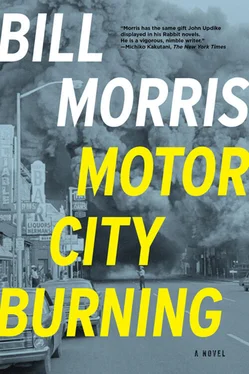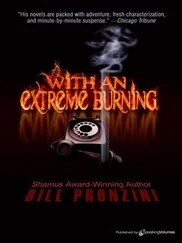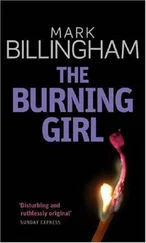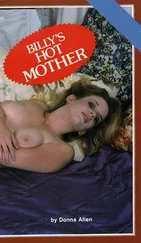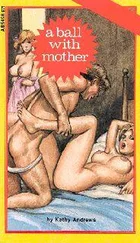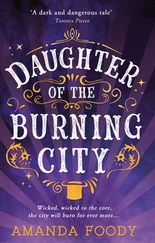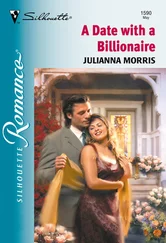Wes said, “Where your Buick at?”
“Out back. I was afraid to leave it on the street — thought they might recognize it and come back for me.”
“We ain’t goin far.”
“Wes, the curfew’s still—”
“Fuck the curfew. Let’s go.”
“Where we going?”
“To my crib. Now quit axin so many questions. It’s payback time. You don’t want a piece a this, then you a stone punk. Gimme the keys to you damn car.”
Willie realized then that he was being offered a choice and a chance, a chance to purge the unbearable thing that had come to live inside him. Again he remembered the night the white cop pulled him over, whacked his head with the flashlight. His life had come full circle: The thing he was capable of doing then was the thing he was obliged to do now. It would be impossible to live with himself if he didn’t take his brother up on this offer. Right now. He said, “I’ll drive.”
All the streetlights on Pallister had been shot out. The only light came from a hazy half moon. Willie drove the Buick with its headlights off and his heart in his mouth, just like Mississippi, driving down those country roads in the dark with your lights off and the gas pedal on the floor, praying you didn’t see headlights in the rearview mirror, praying with everything you had in you. Now Willie prayed all the way to the corner of Hamilton.
Wes told him to turn left and park the car. Then he told him to open the trunk. When Willie did, he was surprised to see a long, lumpy duffel bag next to the spare tire. “How’d that get there?” he said.
“I put it there,” Wes said.
“What’s in it?”
“The fuck you think’s in it?” Wes picked up the bag. It made a clanking noise.
“How long those guns been in my car?” All Willie could think of was what would have happened if the cops had opened his trunk at the fire station. He’d still be in that garage — with no hope of getting out. Suddenly he was furious. “Wes, how fuckin long have those—”
“What difference it make?” Wes slammed the trunk shut, a noise that made Willie jump. “Let’s get off this street fore we get our black asses shot.”
“God dammit , Wes!” Willie shouted.
But Wes ignored him. He crossed the lawn and started up the steps that led to the front door of the Larrow Arms. Willie had to hurry to catch up with him. Even in the watery moonlight he could see that his brother was limping.
Wes took a key from the mop closet on the building’s ground floor, and they went up the darkened staircase tiptoe so as not to wake anybody. They could hear televisions and radios inside some of the apartments. On the fourth floor Wes knocked on the apartment door across the hall from his. The door flew open and there stood Clarence Rawls, a chronically out-of-work autoworker, a part-time car thief and full-time welfare cheat, dressed in a Pistons jersey and cut-off jeans. He had a can of Schlitz malt liquor in one hand and a joint in the other. He was barefoot.
“If it ain’t the brothers Bledsoe!” Clarence cried, sucking on the joint. “Perfect timing. I just walked in the door my ownself.” He had the curtains drawn. The only light in the apartment came from the color television set, which was showing footage of an orange fire eating a supermarket.
“What you been up to?” Wes said.
“Out lootin, like everbody else. Man, I ain’t seen so much innagration in D-troit in all my life — white people helpin black people loot, women with they hair up in curlers, everyone havin a big ole time. I swear, some a them ofays is better at lootin than us brothers.”
He handed the joint to Wes, who took a deep hit. Willie waved it away.
“What’d you get?” Wes said.
“Nothin much tonight, just some necessaries. Some cigarettes and Del Monte’s peaches and a couple fifths a gin. Oh, and I got a nice clock radio for my nephew’s graduatin present.” He opened the door wider. “Come in the house, gentlemens.”
“Later,” Wes said. “We got a little bidness to take care of first.”
“What kinda bidness?”
“Up on the roof.” Wes hefted the duffel bag, that clanking noise again. “You always said you wanted to shoot you a honky, Clarence. Now’s your chance. You comin?”
“You knows I is!”
“Bring some beer,” Wes said. “I got the key to the fifth floor.”
Clarence put on a pair of new sneakers that looked like marshmallows — looted, Willie guessed — and he grabbed two more Schlitz tall boys. The three men marched up the last flight of stairs. As he climbed the stairs, Willie understood that his life was about to change forever and he accepted this with a serenity that surprised him. He welcomed what awaited him on the roof, whatever it proved to be. Someone had to pay for what had happened to him and his brother and the people in the garage and so many others. It was his duty to see that someone paid, and he understood that if he didn’t do his duty he would not be able to go on living.
They walked across the flat roof, gravel crunching underfoot, and suddenly the city was spread before them. No streetlights burned on this side of Woodward — even the Lodge Freeway was dark — and the carpet of darkness stretched almost all the way to the zoo, miles to the north. The only light came from the moon and the fires, dozens of fires. It looked like a city that had been fire-bombed, Willie thought, like newsreel footage of Dresden or Tokyo, or London during the Blitz. Flames shot into the sky, and Willie remembered how beautiful it had been when he and Walter Mitchell watched the flames jump from that warehouse onto the roof of that pitiful two-story house. Fire had a life of its own.
Wes rummaged in the duffel bag and handed Willie a Remington 700 with a Unertl scope. It was a decent gun, good up to several hundred yards. Then Wes handed a rifle to Clarence and selected one for himself. It was too dark for Willie to tell what kinds of guns the other two were.
As Wes passed out ammunition, Willie thought it was a waste to give any to Clarence. At this late hour he was probably seeing triple. But Clarence surprised him. Willie couldn’t find a thing in the Remington’s scope while Clarence, crouching on his right, kept saying, “Lookit that! A motherfuckin cop car, big as day!. . Oooh-wee, a fire truck!. . Damn, I just missed that Jeep!” And every time Clarence spoke, Willie’s right ear rang from the rifle’s roar.
Clarence offered the cans of Schlitz. Wes accepted, but again Willie passed. He couldn’t stomach that skunk piss. Besides, the adrenaline was clearing his head, and this was no time to get sloppy. He had already decided to select his targets carefully, to go for police cars, fire trucks, tanks, Jeeps, men in uniform — anything that shared responsibility for the nightmares he and his brother had just been through. If vengeance was going to accomplish its mission, it had to be precise, an eye for an eye, no more and no less. To kill randomly would be to cheapen the purity of his rage. He was making the rules now. He was above the law, outside the law. He had finally repudiated the world that made him — he had repudiated America itself — and he felt free, truly free and truly alive, for the first time in his life.
But when he got off a clean shot at a police car speeding out the Lodge Freeway, he was yards behind it.
“Remember what I tole you back in Alabama,” Wes said, squeezing off a shot. “Shit. Missed him. Your target’s the eighteen inches between the chin and the belt buckle.”
Willie got off a shot at a Jeep parked on the far side of the freeway but missed badly again. It drove off while he was reloading.
“Y’all see dat?!” Clarence cried.
Willie and Wes peered through their scopes. “See what?” they said in unison.
Читать дальше
